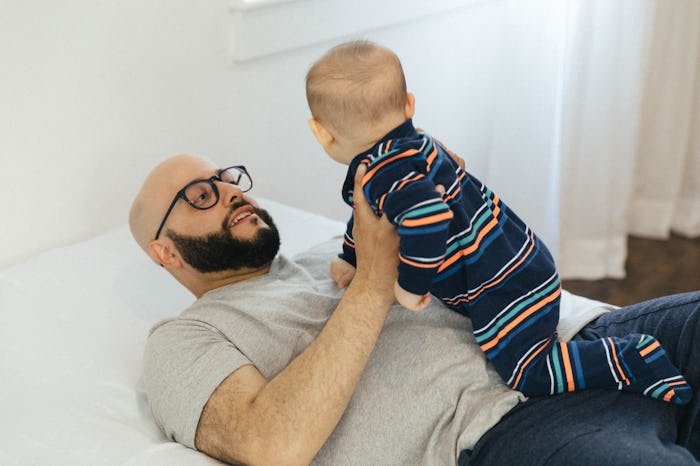My partner and I are emotionally opposite of one another. While I tend to "shoot from the hip" (his words, not mine) when emotions run high, he'd sooner change the subject or forget there's an argument completely. Needless to say, we've had a difficult time meeting in the middle to solve any problems. Of the struggles every mom with a passive parenting partner just knows, making flexibility a priority is high on the list. Still, without compromise, dealing with a passive partner will remain a struggle, so it's best to stick with it. Trust me.
When I met my partner, I knew our personalities would compliment each other (because opposites do attract), but I didn't think about how those same personalities would eventually clash in the future. While I tend to be passive aggressive at times, I'm also great at letting things silently accumulate until they erupt out of me. Those eruptions, unfortunately, are usually directed at my husband. His response, not surprisingly, isn't to erupt back, but to shut down completely. We've struggled greatly with finding better ways to express our feelings but because our responses are so ingrained from childhood, it's a constant, uphill battle.
As willing, hopeful parents, this confrontation and communication issue is more pronounced. When dealing with our kids together, we don't always agree on how to handle some situations. Where he might say, "Whatever you want to do," I'll get frustrated and scream out, "I want you to decide," and we end up nowhere. We're working on it, but it's a tedious journey. Here are some of the struggles that just come with having a passive partner:
Communication Is The Worst
Every mom with a passive parenting partner knows how awful communication can be. There's a serious breakdown happening. When trying to communicate, my partner and I fail to empathize with each other's perspective. The end result is an argument or misunderstandings. Because I've learned to say when I'm upset, and he's learned not to, we're always at an impasse. Passivity, to me, is the emotional equivalent to indifference regarding whether or not we can work together as parents in this thing called life. There's nothing worse, honestly.
You Make All The Major Decisions
A passive partner isn't great at making decisions. That means, when something needs to happen, I have to do it or it won't get done. It's a lot of pressure to be the only person in the relationship having to choose everything from what to eat for dinner, to where we should live — all because my partner would rather not speak up to avoid a disagreement.
Conflict Resolution Is Completely Absent
Sometimes, I just need to vent after a long day and all I want is for my partner to be a sounding board. Others, I'm trying to work through something that's not working in our relationship and I need him to, you know, be an active participant in the conversation. This always ends up the same way: I tell him how I feel, he stares at me, I get upset he's not dealing with the issue, he stares more, and 17 hours later I'm still angry while he pretends everything's fine.
Having a passive partner is frustrating and draining because it feels like I'm doing all the work in being emotionally present. I certainly want to model better strategies than this — if not for us, then for our children.
Avoidance Becomes Normal
Because of how our conversations usually go, my passive partner's learned to avoid important topics altogether. Is this healthy? No. Does it help us? Nope. Actually, it only makes me more inclined to start a controversial conversation to stir the pot. I'd rather argue, but communicate, than avoid, and drift apart.
All Of Life's Pressures Are On You
Much in the way my partner refuses to make decisions, nearly every stressful thing in life is aimed at me, and me alone. Having a passive partner when I'm in need of someone slightly more confrontational means I don't have that person I can go to when I need help with something. Technically, I can, and he's supportive, but it usually ends with him saying, "Whatever you decide."
At times, I want more.
It's Lonely
Every mom who has a parenting partner that deals with conflict differently knows the struggle. It's sometimes really lonely. We have no one we can talk things through — no matter the outcome — and there's an underlying fear to have conversations at all. There have been times I've just wanted to talk about anything, and if my partner's feeling particularly closed off, I'm met more blank staring or a conversation cut short. This is why I talk to my cats so much.
The Kids Know Who To Ask For Things (It's Not You)
My kids know that if they come to me with an outrageous request, I'll likely turn them down. If they go to their dad, they'll more than likely get their way because he'll want to avoid the fallout if he says no. It's a fun game they've made of it.
Having a passive partner is frustrating but, at the end of the day, we're trying to find any way we can to make it work. Communication is difficult for most people, regardless of how they deal with conflict, so when we're really struggling to find our way I focus on what we're doing right. We laugh a lot. Our kids are great, and despite differences in communication styles, there's a lot of love. Sometimes, that has to be enough.
